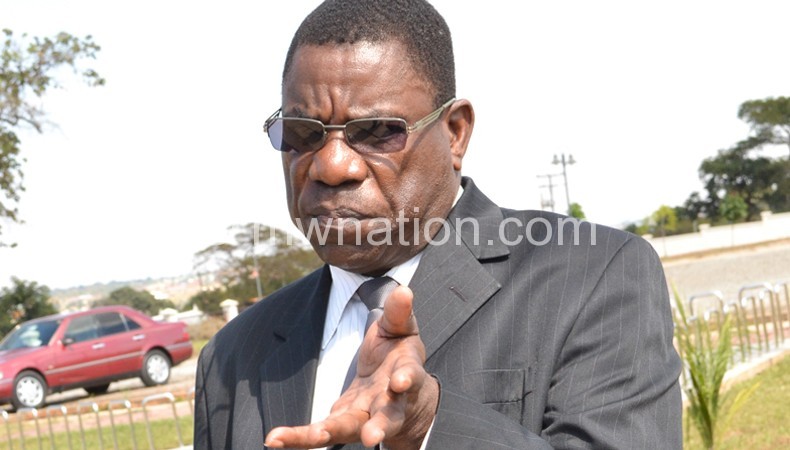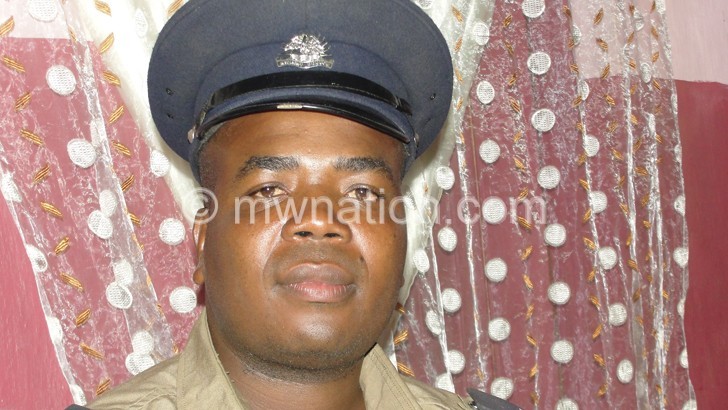Man wets himself at bank
No one would wish to be in the shoes of William Sichinga, a Blantyre-based entrepreneur, who recently peed in his trousers after waiting for about three hours to be served at a bank that later denied him access to its toilets, citing security reasons.
On April 30, Sichinga entered the banking hall of National Bank of Malawi’s (NBM) Henderson Street Branch at about 8:45 am where, he claims, he has four accounts.

He hoped his business would be concluded within a short period as he was just verifying his accounts in compliance with Know Your Customer requirements. But he was held up until about 11 am.
While in the bank, Sichinga says he was pressed with the urge to answer the call of nature, but decided to hold himself so as to finish the bank business first.
When he was done, Sichinga begged the bank’s guards to allow him to visit the restroom but citing security concerns, the guards could not allow him.
Sichinga could no longer control himself and wet his trousers as a result.
“This was an embarrassing incident,” Sichinga said in an interview two weeks ago.
“I was told in the face that it was against bank’s policy and I thought the banks were supposed to publicly announce this policy. I immediately made an inquiry with NBM to confirm this policy,” he said.
In an e-mail complaint that Sichinga sent to NBM’s account relationship manager Chimwemwe Mtima-Jere at 4.30 pm the same day, he narrated his ordeal.
In response, Mtima-Jere apologised for the incident and reiterated that the bank’s security policy does not allow customers to use its washroom facilities.
“The bank does not have such facilities for security concerns, and the guards did that based on this concern. However, under extreme circumstances we do find means of assisting customers,” responded Mtima-Jere.
The bank’s response did not satisfy Sichinga who wrote back: “For whatever reason, it is unethical for a business expected to transact with thousands of customers within its premises each day to allow no toilet facilities to those customers.”
Sichinga’s response did not please NBM which suspected that he had other ulterior motives and it responded: “It seems you are very much bound to do harm to NBM, than proposing a way forward. We urge you to act with a sober mind, and check if other banks have such facilities.”

In a telephone interview with Weekend Nation, NBM public relations officer Anne Magola also accused Sichinga of personalising the issue “because he has issues with the bank”.
But Consumers Association of Malawi (Cama) this week described Sichinga’s incident as unfortunate.
Cama executive director John Kapito said banks are meant for speedy short transactions.
“If our banks were geared towards efficiency in the manner they treat and serve consumers, no one would have complained about toilets. It is a requirement for banks to provide such amenities given the time we spend in banking halls,” said Kapito.
He urged banks to ensure that consumers in need of toilets are assisted without compromising the banks’ security.
“Given the current poor services, where consumers spend long hours to be assisted, we need toilets in banks. In fact, [other banks] provide premier consumers access to toilet facilities; what is wrong with the rest of the consumers?” he wondered.
Kapito said banks in Malawi “love” to see people suffering and standing on the queues for a long time.
“One wonders how on earth any supervisor would sit on her or his chair and watch a large group of consumers queuing over one teller when most bank employees are busy eating tangerines and groundnuts, and chatting on Whatsapp,” he said.
A Lilongwe-based sanitation expert Michael Chimaliza observed that there was no standard policy for banking halls not to have sanitation facilities.
“From the public health point of view, the general public expects banks to provide such facilities in the banking halls because these are public or business buildings in which members of the general public go to transact businesses and mostly take long hours as is the experience here in Malawi,” he said.
A random check in six commercial banks yesterday showed that three of the banks have special restrooms for customers while the other three did not have toilets and simply apologized to our ‘pressed’ reporter.
Bankers Association of Malawi executive director Lyness Nkungula said in an e-mail response to our questionnaire that restrooms are not provided in the banking halls for security reasons and that if a person is pressed, he or she has the liberty to ask for a restroom.
On banks’ slow service delivery, Nkungula said the banks determine how many tellers they need depending on the number of customers.
“There are usually long queues during month end; in the middle of the month, the queues are not that long,” she observed.
She said the banks are promoting alternative banking avenues such as mobile banking, which, she hoped, customers would quickly embrace.
“Two banks have introduced the deposit taking machine but so far, you will find that people still queue inside to deposit their money. Customers would rather go in the banking hall to make withdrawals because of certain beliefs,” she said without elaborating.
However, Reserve Bank of Malawi (RBM) spokesperson Mbane Ngwira said a Banking (Premises Inspection) directive issued to all banks in 2012 by the Registrar of Financial Institutions requires banks to provide customers access to sanitary facilities such as restrooms and drinking water.
He said RBM has also noted with concern that banking halls are characterised by long queues while some teller cubicles remain unmanned.
“In line with this observation, the Reserve Bank through its Consumer Protection and Financial Literacy unit conducts routine surveillance in banking premises to ensure that there are no long queues,” he said.
He explained that where long queues are persistent, banks are advised to establish more cubicles and recruit additional tellers.
“It is important to note, however, that the number of tellers allocated or employed to serve customers is more of a business consideration rather than a regulatory issue. From a consumer protection point of view, the Reserve Bank encourages customers to demand quality service from their banks at all times.
“Customers can access banking services within 10 minutes if it is three weeks preceding month ends. We are, however, aware that banking halls, including automated teller machines (ATMs), have long queues during month ends and it may take a long time for a customer to access a banking service. This development is obviously deplorable,” he said.
Mbane urged bank users to embrace technological innovations such mobile and Internet money services, debit cards and automated teller machines for both withdrawals and deposits, existing in the financial system.
“The innovations will likely reduce queuing in the banking halls,” he said.






mpakana identification????? ulemu mulibe???
I have always wondered why banks cannot have a “public” toilet if security is their concern in using “their” toilets
Nzosakhala bwino ndithu, papezeke njira zina ndithu
The name of the victim shouldn’t have been disclosed, I think. It’s unethical in this case. It was an embarrassing moment for him in the banking hall but now it’s on the net for everyone to see!